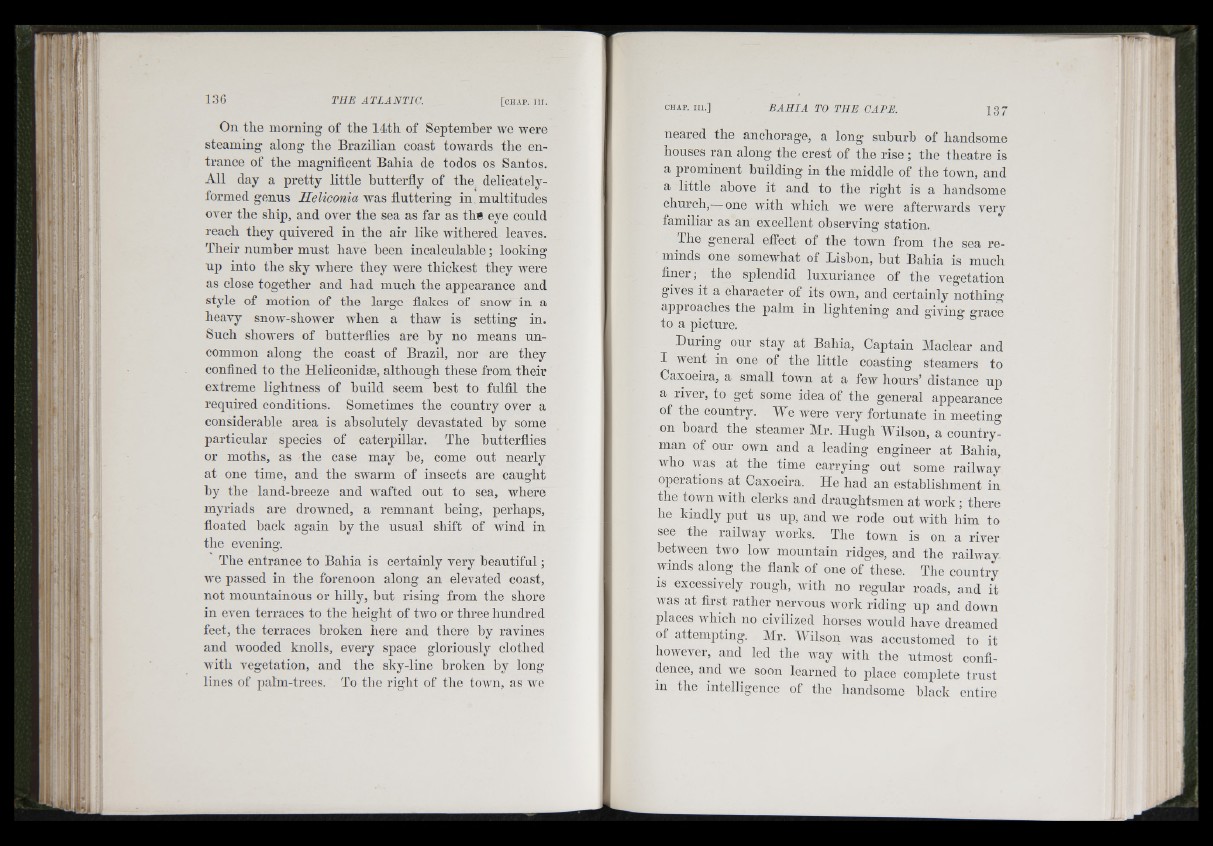
0)1 the morning of the 14th of September Ave AA'ere
steaming along the Brazilian coast toAvards the entrance
of the magniiicent Bahia de todos os Santos.
All day a pretty little butterfly of the delicately-
formed genus IleUconia aa'us fluttering in multitudes
OA'er the ship, and over the sea as far as the eye could
reach they quivered in the air like Avithered leaves.
Their number must have been incalculable; looking
up into the sky Avhere they AA'ere thickest they Avere
as close together and had much the appearance and
style of motion of the large flakes of snoAV in a
lieaA'y snoAV-shoAver AA'hen a thaw is setting in.
Such showers of butterflies are hy no means uncommon
along the coast of Brazil, nor are they
confined to the Heliconidm, although these from their
extreme lightness of build seem best to fulfil the
required conditions. Sometimes the country over a
considerable area is absolutely devastated hy some
particular species of caterpillar. The butterflies
or moths, as the case may he, come out nearly
at one time, and the sAvarm of insects are caught
hy the land-breeze and Avafted out to sea, where
myriads are drowned, a remnant heing, perhaps,
floated hack again hy the usual shift of Avind in
the evening.
The entrance to Bahia is certainly very b e au tifu l;
Ave passed in the forenoon along an elevated coast,
not mountainous or hilly, but rising from the shore
in even terraces to the height of tAvo or three hundred
feet, the terraces broken here and there by ravines
and AA'ooded knolls, every space gloriously clothed
Avith vegetation, and the sky-line broken by long
lines of palm-trees. To tbe right of tbe toAvn, as aa'c
neared the anchorage, a long suburb of handsome
houses ran along the crest of the rise ; the theatre is
a prominent building in the middle of the town, and
a little ahove it and to the right is a handsome
church,^—one Avith which we Avere afterAA'ards very
familiar as an excellent observing station.
The general effect of the town from the sea re minds
one somewhat of Lisbon, hut Bahia is much
fin e r; the splendid luxuriance of the vegetation
gives it a character of its own, and certainly nothing
appioaches the palm in lightening and giving grace
to a picture.
During our stay at Bahia, Captain Maclear and
I went in one of the little coasting steamers to
Caxoeira, a small town at a few hours’ distance up
a river, to get some idea of the general appearance
of the country. We were very fortunate in meeting
on hoard the steamer Mr. Hugh AYilson, a countryman
of our OAvn and a leading engineer at Bahia,
AAdio Avas at the time carrying out some railway
operations at Caxoeira. He had an establishment in
the town Avith clerks and draughtsmen at Avork; there
he kindly put us up, and Ave rode out Avith him to
see the railway Avorks. The toAvn is on a river
between two Ioav mountain ridges, and the raihvay
winds along the flank of one of these. The country
is excessively rough, with no regular roads, and it
Avas at first rather nervous Avork riding up and doAvn
places Avhich no civilized horses Avould have dreamed
of attempting. Mr. Milson Avas accustomed to it
liowever, and led the Avay with the utmost confidence,
and Ave soon learned to place complete trust
in the intelligence of the handsome hlack entire